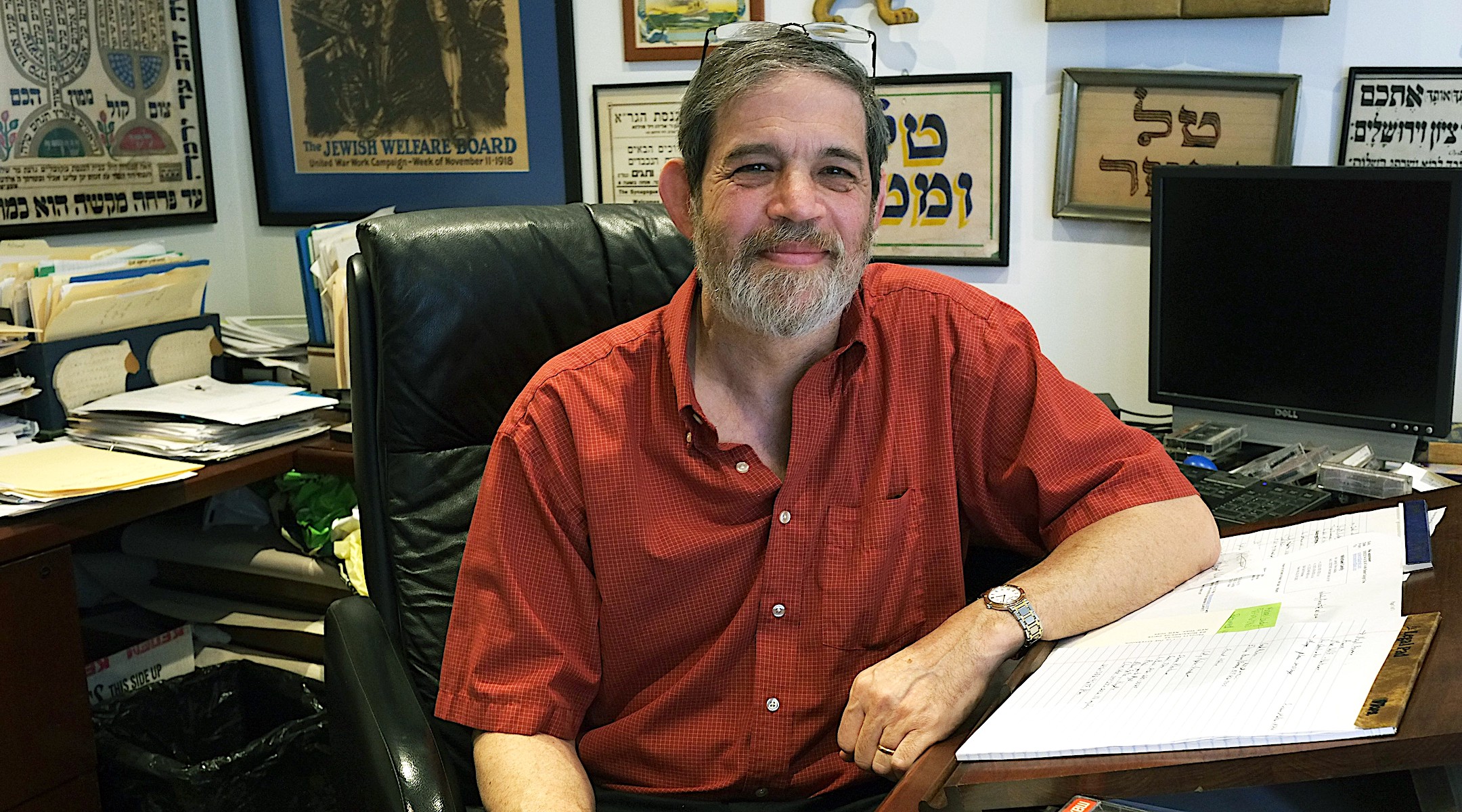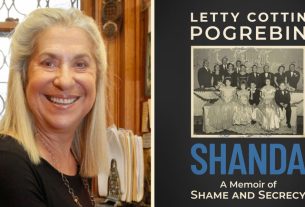(JTA) — “What the son wishes to forget the grandson wishes to remember.” That’s known as Hansen’s Law, named for the historian Marcus Lee Hansen, who observed that while the children of immigrants tend to run away from their ethnicity in order to join the mainstream, the third generation often wants to learn the “old ways” of their grandparents.
In 1973, “The Jewish Catalog” turned Hansen’s Law into a “do-it-yourself kit” for young Jews who wanted to practice the traditions of their grandparents but weren’t exactly sure how. Imagine “The Joy of Cooking,” but instead of recipes the guide to Jewish living had friendly instructions for hosting Shabbat, building a sukkah and taking part in Jewish rituals from birth to death. Co-edited by Michael Strassfeld, Sharon Strassfeld and the late Richard Siegel, it went on to sell 300,000 copies and remains in print today.
Fifty years later, Rabbi Michael Strassfeld has written a new book that he calls a “bookend” to “The Jewish Catalog. ”If the first book is a Jewish “how to,” the latest is, he says, a “why bother?”
“Judaism Disrupted: A Spiritual Manifesto for the 21st Century” asserts that an open society and egalitarian ethics leave most Jews skeptical of the rituals and beliefs of Jewish tradition. In the face of this resistance, he argues that the purpose of Judaism is not obedience to Torah and its rituals for their own sake or mere “continuity,” but to “encourage and remind us to strive to live a life of compassion, loving relationships, and devotion to our ideals.”
Strassfeld, 73, grew up in an Orthodox home in Boston and got his master’s degree in Jewish studies at Brandeis University. Coming to doubt the “faith claims” of Orthodoxy, he became a regular at nearby Havurat Shalom, an “intentional community” that pioneered the havurah movement’s liberal, hands-on approach to traditional practice. He earned rabbinical ordination from the Reconstructionist Rabbinical College when he was 41 and went on to serve as the rabbi of Congregation Ansche Chesed on the Upper West Side and later the Society for the Advancement of Judaism, the Manhattan flagship of Reconstructionist Judaism.
“To be disrupted is to experience a break with the past and simultaneously reconnect in a new way to that past,” writes Strassfeld, who retired from the pulpit in 2015. This week, we spoke about why people might find Jewish ritual empty, how he thinks Jewish practices can enrich their lives and how Passover — which begins Wednesday night — could be the key to unlocking the central idea of Judaism.
Our conversation was edited for length and clarity.
Jewish Telegraphic Agency: I wanted to start with the 50th anniversary of the “Jewish Catalog.” What connects the new book with the work you did back then on the “Catalog,” which was a do-it-yourself guide for Jews who were trying to reclaim the stuff they either did or didn’t learn in Hebrew school?
Michael Strassfeld: I see them as bookends. Basically, I keep on writing the same book over and over again. [Laughs] Except no, I’m different and the world is different. I’m always trying to make Judaism accessible to people. In the “Catalog” I was providing the resources on how to live a Jewish life when the resources weren’t easily accessible.
The new book is less about “how to” than “why bother?” That’s the challenge. I think a lot of people take pride in being Jewish, but it’s a small part of their identity because it doesn’t feel relevant. I want to say to people like that that Judaism is about living a life with meaning and purpose. It’s not about doing what I call the “Jewishly Jewish” things, like keeping kosher and going to synagogue. Judaism is wisdom and practices to live life with meaning and purpose. The purpose of Judaism isn’t to be a good Jew, despite all the surveys that give you 10 points for, you know, lighting Shabbat candles. It’s about being a good person.
So that brings up your relationship to the commandments and mitzvot, the traditional acts and behaviors that an Orthodox Jew or a committed Conservative Jew feels commanded to do, from prayer to keeping kosher to observing the Sabbath and the holidays. They might argue that doing these things is what makes you Jewish, but you’re arguing something different. If someone doesn’t feel bound by these obligations, why do them at all?
I don’t have the faith or beliefs that underlie such an attitude [of obligation]. Halacha, or Jewish law, is not in reality law. It’s really unlike American law where you know that if you’re violating it, you could be prosecuted. What I’m trying to do in the book is reframe rituals as an awareness practice, that is, bringing awareness to various aspects of our lives. So it could be paying attention to food, or cultivating attitudes of gratitude, or generosity, or satisfaction. My broad understanding of the festival cycle, for example, is that you can focus on those attitudes all year long, but the festivals provide a period of time once in the year to really focus on, in the case of Rosh Hashanah and Yom Kippur, for example, saying sorry and repairing relationships.
In “Judaism Disrupted: A Spiritual Manifesto for the 21st Century,” Michael Strassfeld argues that the challenge of each generation’s Jews is to create the Judaism that is needed in their time. (Ben Yehuda Press)
Passover is coming. Probably no holiday asks its practitioners to do so much stuff in preparation, from cleaning the house of every trace of unleavened food to hosting, in many homes, two different catered seminars on Jewish history. Describe how Passover cultivates awareness, especially of the idea of freedom, which plays an important part thematically in your book.
The Sefat Emet [a 19th-century Hasidic master] says Torah is all about one thing: freedom. But there’s a variety of obstacles in the way. There are temptations. There’s the inner issues that you struggle with, and the bad things that are out of your control. The Sefat Emet says the 613 commandments are 613 etzot, or advice, that teach us how to live a life of freedom. The focus of Passover is trying to free yourself from the chains of the things that hold you back from being the person that you could be, not getting caught up in materiality or envy, free from unnecessary anxieties — all these things that distract us or keep us from being who we could be.
The Passover seder is one of the great rituals of Judaism. We’re trying to do a very ambitious thing by saying, not, like, “let’s remember when our ancestors were freed from Egypt,” but rather that we were slaves in Egypt and we went free. And at the seder we actually ingest that. We experience the bitterness by eating maror, the bitter herb. We experience the freedom by drinking wine. We don’t want it just to be an intellectual exercise.
Unfortunately the seder has become rote. But Passover is about this huge theme of freedom that is central to Judaism.
I think some people bristle against ritual because they find it empty. But you’re saying there’s another way to approach rituals which is to think of them as tools or instruments that can help you focus on core principles — you actually list 11 — which include finding holiness everywhere, caring for the planet and engaging in social justice, to name a few. But that invites the criticism, which I think was also leveled at the “Catalog,” that Judaism shouldn’t be instrumental, because if you treat it as a means to an end that’s self-serving and individualistic.
Certainly rituals are tools, but tools in the best sense of the word. They help us pay attention to things in our lives and things in the world that need repair. And people use them not to get ahead in the world, but because they want to be a somewhat better person. I talk a lot these days about having a brief morning practice, and in the book I write about the mezuzah. For most Jews it’s become wallpaper, but what if you take the moment that you leave in the morning, and there’s a transition from home to the outside and to work perhaps, and take a moment at the doorpost to spiritually frame your day? What are the major principles that you want to keep in your mind when you know you’re gonna be stuck in traffic or a difficult meeting?
And a lot of traditional rituals are instrumental. Saying a blessing before you eat is a gratitude practice.
But why do I need a particular Jewish ritual or practice to help me feel gratitude or order my day? Aren’t there other traditions I can use to accomplish the same things?
Anybody who is a pluralist, which I am, knows that the Jewish way is not the only way. If I grew up in India or Indonesia and my parents were locals I probably wouldn’t be a rabbi and writing these books.
But a partial answer to your question is that Judaism is one of the oldest wisdom traditions in the world, and that there has been a 3,000-year conversation by the Jewish people about what it means to live in this tradition and to live in the world. And so I think there’s a lot of wisdom there.
So much in Jewish tradition says boundaries are good, and that it’s important to draw distinctions between what’s Jewish behavior and what’s not Jewish behavior, between the holy and the mundane, and that making those distinctions is a value in itself. But you argue strongly in an early chapter that that kind of binary thinking is not Judaism as you see it.
Underlying the book is the notion that Rabbinic Judaism carried the Jewish people for 2,000 years or so. But we’re living in a very different context, and the binaries, the dualities — too often they lead to hierarchy, so that, for example, men matter more than women in Jewish life. And we’ve tried to change that. We are living in an open society where we want to be more inclusive, not less inclusive. We don’t want to live in ghettos. Now, the ultra-Orthodox say, “No, we realize the danger of trying to live like that. We don’t think there’s anything of value in that modern world. And it’s all to be rejected.” And it would be foolish not to admit that in this very open world the Jews, as a minority, could kind of disappear. But I think that Judaism has so much value and wisdom and practices to offer to people that Judaism will continue to be part of the fabric of this world — the way, for example, we have given Shabbat as a concept to the world.
You know, in the first 11 chapters of the Torah, there are no Jews. So clearly, Jews and Judaism are not essential for the world to exist. And that’s a good, humbling message.
OK, but one could argue that while Jews aren’t necessary for the world to exist, Judaism is necessary for Jews to exist. And you write in your book, “If the Jewish people is to be a people, we need to have a commonly held tradition.” I think the pushback to the kind of openness and permeability you describe is that Jews can be so open and so permeable that they just fall through the holes.
It certainly is a possibility. And it’s also a possibility that the only Jews who will be around will be ultra-Orthodox Jews.
But if Judaism can only survive by being separatist, then I question whether it’s really worthwhile. That becomes a distorted vision of Judaism, and withdrawing is not what it’s meant to be. I think we’re meant to be in the world.
Your book is called “Judaism Disrupted.” What is disruptive about the Judaism that you’re proposing?
I meant it in two ways. First, Judaism is being disrupted by this very different world we’re living in. The contents of the ocean we swim in is very different than in the Middle Ages. But I’m also using it to say that Judaism is meant to disrupt our lives in a positive way, which is to say, “Wake up, pay attention.” You are here to live a life of meaning and purpose, and to continue as co-creators with God of the universe. You’re here to make the world better, to be kind and compassionate to people, to work on yourself. In my mind it is a shofar, “Wake up, sleepers, from your sleep!” “Judaism Disrupted” says you have to pay attention to issues like food, and justice, and teshuva [repentance].
You were ordained as a Reconstructionist rabbi. Do you think your book falls neatly into any of our current denominational categories?
[Reconstructionist founder] Rabbi Mordecai Kaplan’s notion of Judaism as an evolving religious civilization is the one that I feel closest to. But I feel that the denominational structure isn’t particularly useful anymore. There’s basically two categories, Orthodox and the various kinds of liberal Judaism, within a spectrum. The modern world is so fundamentally different in its relationship to Jews and Judaism that what we’re seeing is a variety of attempts to figure out how to respond. And that will then become the Judaism for the next millennium. It’s time for a lot of experimentation. I think that’s required and out of that will come a new “Minhag America,” to use Isaac Mayer Wise’s phrase for the emerging custom of American Jews [Wise was a Reform rabbi in the late 19th century]. And we don’t need to have everybody doing it one way. As long as people feel committed to Judaism, the Jewish tradition, even if they’re doing it very differently than the Jews of the past, they will be writing themselves into the conversation.

is is Editor at Large of the New York Jewish Week and Managing Editor for Ideas for the Jewish Telegraphic Agency.
The views and opinions expressed in this article are those of the author and do not necessarily reflect the views of JTA or its parent company, 70 Faces Media.




